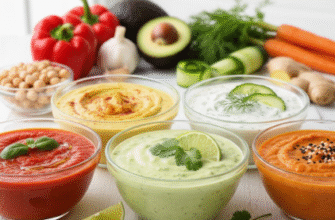That familiar feeling hits – the dreaded afternoon slump. Your eyelids feel heavy, concentration wanders, and the thought of tackling your to-do list seems overwhelming. Before you reach for that sugary energy drink or third cup of coffee, consider a more sustainable solution: fueling your body with the right kinds of food. What we eat has a direct impact on our energy levels throughout the day, and choosing wisely can mean the difference between powering through and crashing hard.
It’s easy to fall into the trap of quick fixes. Sugary snacks and drinks provide a rapid burst of energy, sure, but it’s fleeting. This is because simple sugars cause a rapid spike in blood glucose, followed by an equally rapid drop, leaving you feeling even more tired and sluggish than before. True, lasting energy comes from nutrients that your body can process steadily, providing a consistent fuel source.
Understanding Your Fuel Source: Macronutrients for Energy
Think of your body like a high-performance vehicle; it needs the right kind of fuel to run efficiently. The main fuel sources come from macronutrients: carbohydrates, proteins, and fats. Getting the right balance is key for sustained energy.
Complex Carbohydrates: The Slow-Burn Fuel
Carbohydrates often get a bad rap, but they are your body’s primary source of energy. The trick is choosing the right kind. Complex carbohydrates, found in whole grains, fruits, vegetables, and legumes, are packed with fiber. Fiber slows down the digestion and absorption of sugars into your bloodstream, preventing those energy spikes and crashes. Instead, you get a steady, reliable release of energy.
- Oats: A breakfast champion for a reason. Rolled oats or steel-cut oats are full of soluble fiber, keeping you full and energized for hours.
- Brown Rice & Quinoa: Excellent alternatives to white rice, offering more fiber, vitamins, and minerals for sustained energy release.
- Whole-Wheat Bread & Pasta: Choose 100% whole wheat options for a fiber boost compared to their refined white counterparts.
- Sweet Potatoes: Packed with complex carbs, fiber, and essential vitamins like Vitamin A.
- Legumes (Beans, Lentils, Chickpeas): A fantastic source of both complex carbs and plant-based protein.
Protein: The Sustainer and Builder
Protein plays a crucial role in building and repairing tissues, but it also contributes to energy levels. Including protein in your meals and snacks helps to slow down the absorption of carbohydrates further, promoting satiety and preventing energy dips between meals. It keeps you feeling fuller for longer and helps stabilize blood sugar.
- Eggs: A complete protein source, also rich in B vitamins which are essential for converting food into energy.
- Lean Meats (Chicken, Turkey, Fish): Provide high-quality protein and essential nutrients like iron, which helps transport oxygen (crucial for energy production).
- Greek Yogurt: Higher in protein than regular yogurt, making it a great snack or breakfast addition.
- Nuts & Seeds: Offer a combination of protein, healthy fats, and fiber.
- Tofu & Edamame: Excellent plant-based protein options.
Healthy Fats: Brain Power and Endurance
Fat is another essential macronutrient, providing a concentrated source of energy. Healthy fats, particularly unsaturated fats and omega-3 fatty acids, are vital for brain health, hormone production, and sustained energy. They digest slowly, contributing to long-lasting satiety and energy.
- Avocado: Rich in monounsaturated fats, fiber, and various vitamins.
- Nuts (Almonds, Walnuts, Cashews): A powerhouse of healthy fats, protein, and fiber. Walnuts are particularly noted for their omega-3 content.
- Seeds (Chia, Flax, Pumpkin, Sunflower): Offer healthy fats, fiber, and minerals. Chia and flax seeds are excellent sources of plant-based omega-3s.
- Olive Oil: A staple of healthy diets, rich in monounsaturated fats.
- Fatty Fish (Salmon, Mackerel, Sardines): The best sources of EPA and DHA omega-3 fatty acids, known for supporting brain function and reducing fatigue.
Spotlight on Energy-Boosting Superstars
While a balanced diet is paramount, some foods stand out for their energy-enhancing properties.
Bananas
Often called nature’s power bar, bananas are a fantastic source of easily digestible carbohydrates, natural sugars, and potassium. Potassium is an electrolyte crucial for nerve function and muscle contractions, and levels can dip with dehydration or exertion, leading to fatigue. A banana provides a quick yet relatively stable energy boost, perfect before a workout or during an afternoon lull.
Leafy Greens
Spinach, kale, Swiss chard, and other leafy greens are nutritional powerhouses. They are rich in iron, a mineral essential for producing hemoglobin, which carries oxygen in your blood. Low iron levels can lead to fatigue and weakness. These greens also provide magnesium and B vitamins, further supporting energy metabolism.
Nuts and Seeds
A small handful of almonds, walnuts, chia seeds, or pumpkin seeds makes for an ideal energy-boosting snack. They provide a balanced mix of protein, healthy fats, and fiber. This combination promotes satiety and provides sustained energy release without spiking blood sugar. Magnesium, abundant in many nuts and seeds, also plays a vital role in converting food into usable energy.
Verified Insight: Focusing on whole foods rich in complex carbohydrates and fiber provides a steady release of energy, unlike the rapid spike and crash associated with simple sugars. This sustained fuel helps maintain focus and stamina throughout the day. Combining these carbs with protein and healthy fats further optimizes energy levels and promotes overall well-being.
Water: The Unsung Hero
It might not be a ‘food’, but water is absolutely critical for energy levels. Dehydration, even mild dehydration, can cause significant fatigue, brain fog, and sluggishness. Water is involved in virtually every metabolic process in the body, including energy production and nutrient transport. Aim to sip water consistently throughout the day, rather than waiting until you feel thirsty.
Timing Matters: Eating for Optimal Energy Flow
When you eat can be almost as important as what you eat for maintaining energy.
- Don’t skip breakfast: Start your day with a balanced meal containing complex carbs, protein, and healthy fats to kickstart your metabolism and provide energy for the morning.
- Eat regularly: Aim for meals or snacks every 3-4 hours to keep blood sugar levels stable and prevent energy crashes.
- Balance your meals: Ensure each meal includes a mix of macronutrients for sustained energy release.
- Smart snacking: Choose snacks wisely. Instead of reaching for candy, opt for fruit with nuts, yogurt with berries, or whole-grain crackers with hummus.
- Listen to your body: Pay attention to your hunger and fullness cues. Eating when you’re genuinely hungry and stopping when you’re satisfied helps maintain energy balance.
Fueling Your Life, Naturally
Boosting your energy naturally doesn’t require drastic measures or expensive supplements. By focusing on a balanced diet rich in whole foods – complex carbohydrates, lean proteins, healthy fats, fruits, and vegetables – you provide your body with the high-quality, sustained fuel it needs to thrive. Remember the importance of hydration and mindful eating patterns. Making conscious choices about what you put on your plate is a powerful way to combat fatigue and embrace a more vibrant, energized life, one delicious bite at a time.








